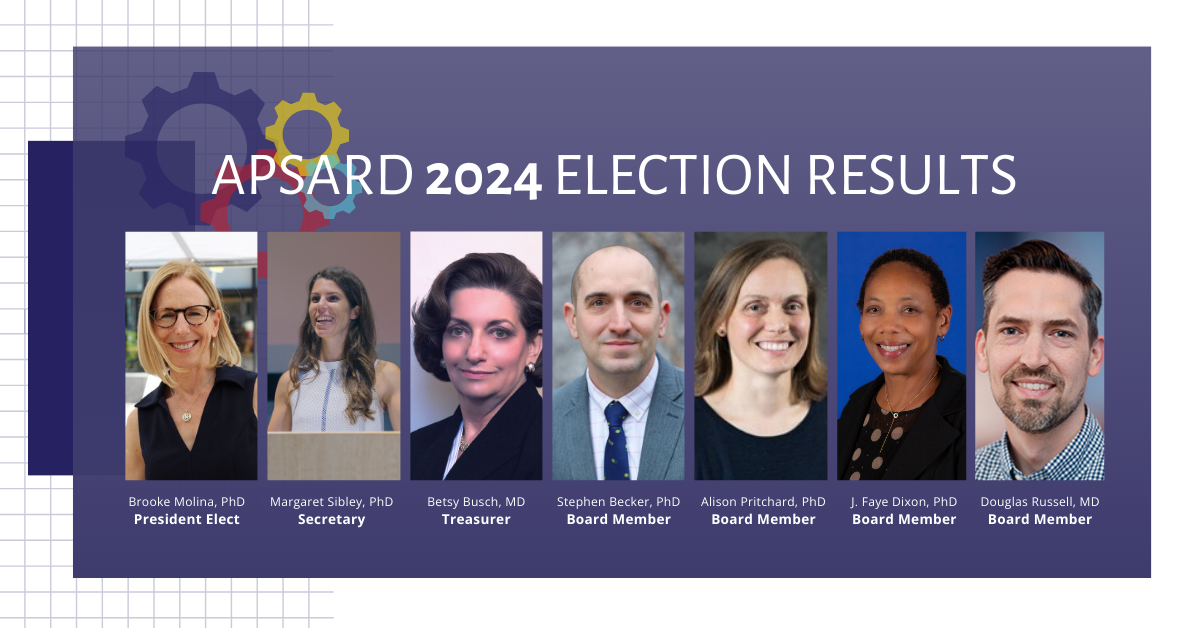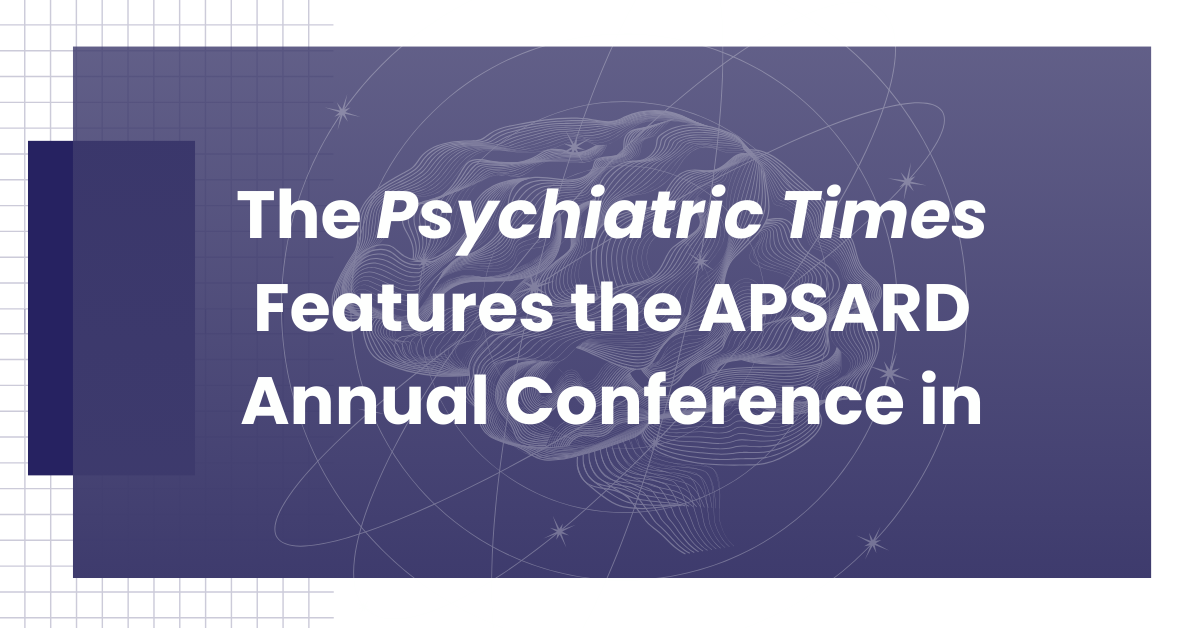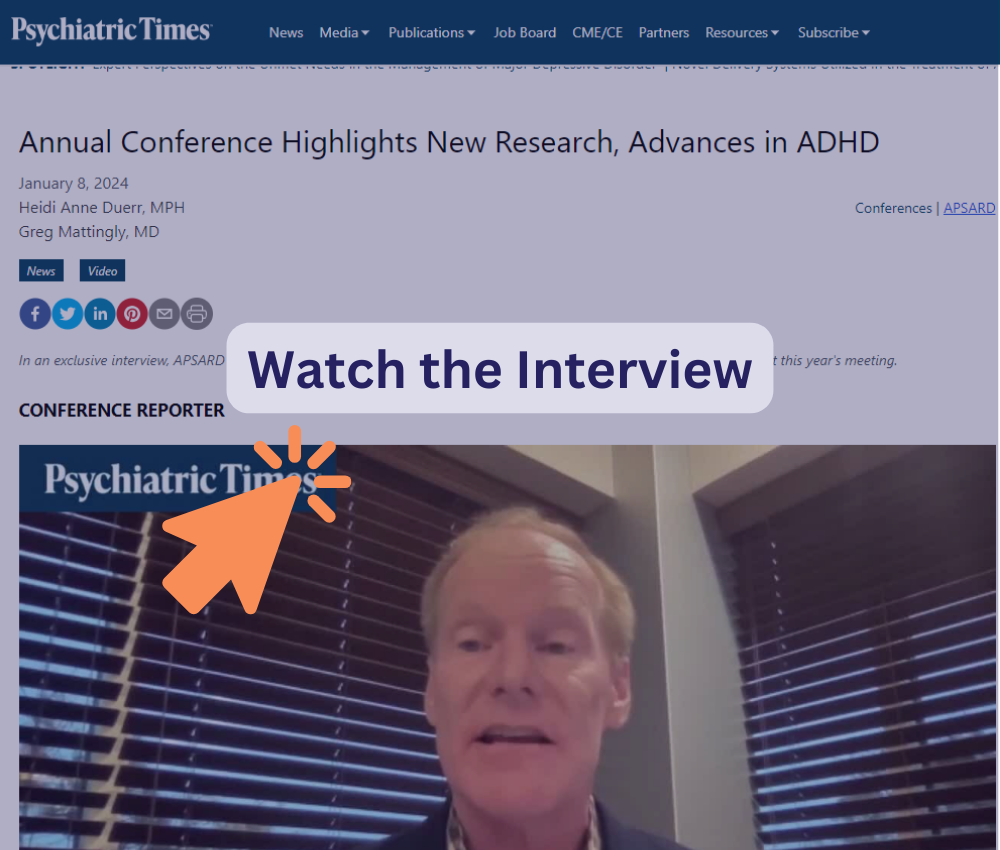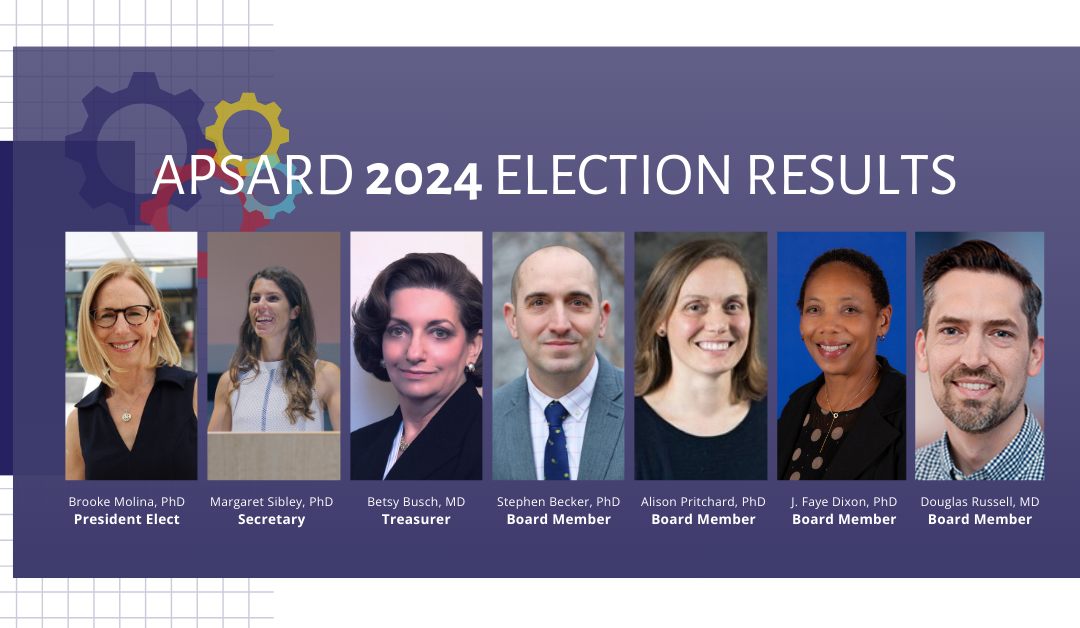
Feb 15, 2024 | Annual Conference, APSARD in the News
We are delighted to announce the results of our 2024 board elections, marking a significant transition in leadership. As we extend our appreciation to the outgoing board members, we are excited to welcome the newly elected individuals:
- Brooke Molina, PhD – President Elect
- Margaret Sibley, PhD – Secretary
- Betsy Busch, MD – Treasurer
- Stephen Becker, PhD – Board Member
- Alison Pritchard, PhD – Board Member
- J. Faye Dixon, PhD – Board Member
- Douglas Russell, MD – Board Member
A thank you to the outgoing members who have played a pivotal role in shaping APSARD:
- Sam Goldstein, PhD
- Martin Katzman, MD
- Mark Bertin, MD
- Jeffrey Newcorn, MD
- David Goodman, MD
- Beth Krone, PhD
APSARD is thrilled to have a diverse group of experts with a wealth of knowledge and dedication to steering our organization toward continued success in the new year!
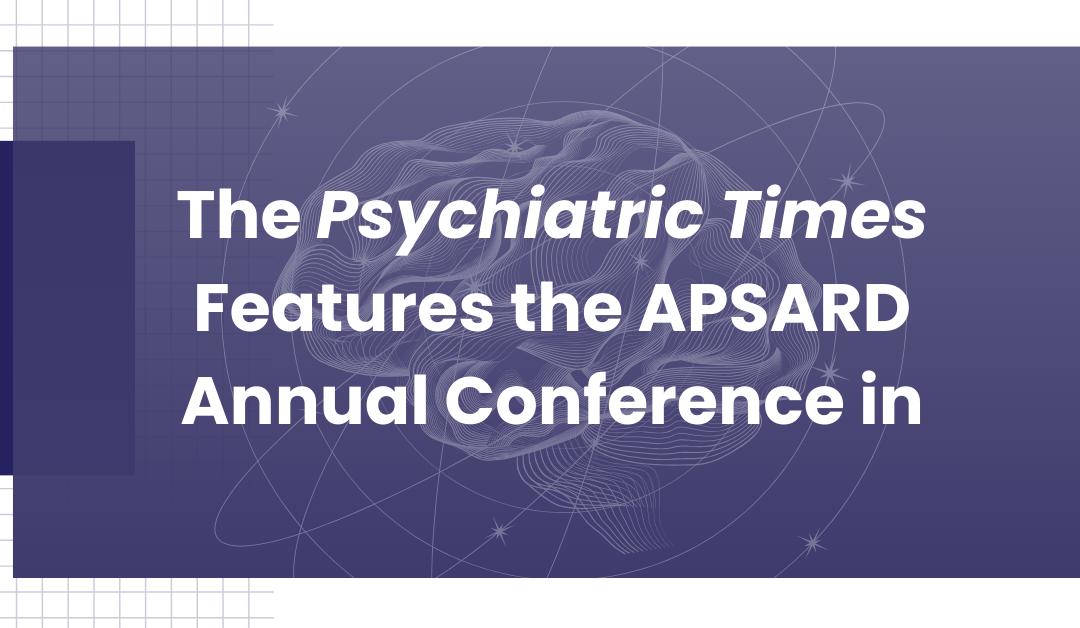
Jan 29, 2024 | Annual Conference, APSARD in the News
The Psychiatric Times has highlighted the 2024 APSARD Annual Conference in a featured article. This piece provides a concise overview of the sessions conducted by APSARD’s Executive Committee Members on the first day, featuring presentations from experts such as Greg Mattingly, M.D., David Goodman, M.D., L.F.A.P.A., Margaret Sibley, Ph.D., Ann Childress, M.D., and Jeff Newcorn, M.D.
Explore the insightful summaries by clicking here.
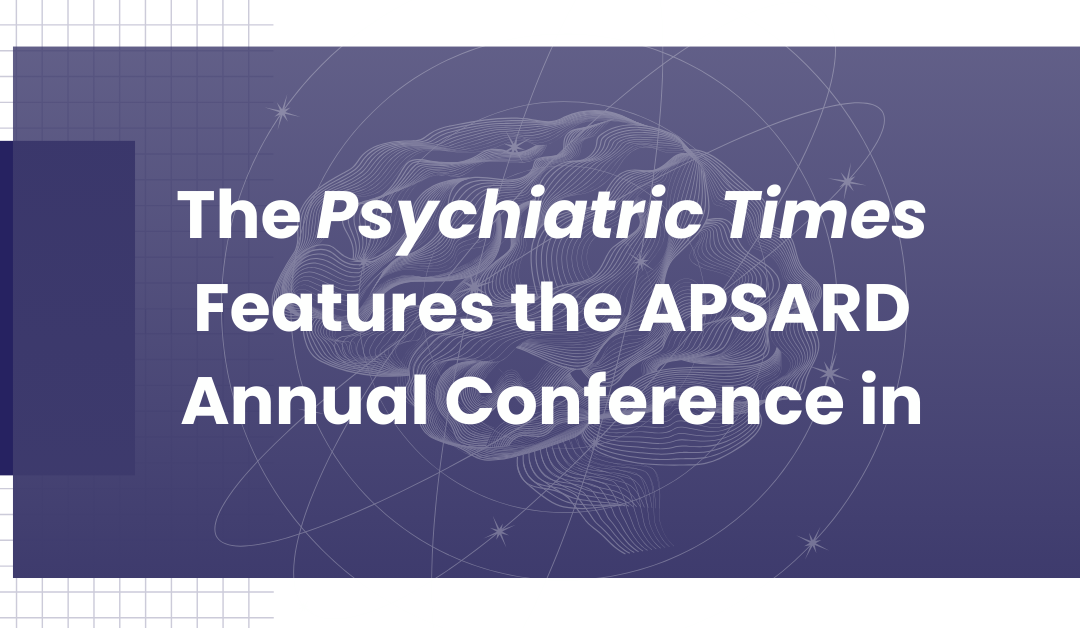
Jan 17, 2024 | Annual Conference, APSARD in the News
We, at APSARD, are eagerly anticipating the kick-off of our 2024 conference in Orlando, Florida, on January 18th! This year’s conference promises to be even more exciting and informative than ever before, with a focus on ADHD across special populations, groundbreaking research, and practical tools for clinical practice.
To learn more about what you can expect from the APSARD 2024 conference, be sure to watch this interview with APSARD President-Elect Dr. Gregory W. Mattingly. In this interview, Dr. Mattingly discusses the conference’s highlights, why he’s so excited about this year’s event, and how APSARD is working to improve outcomes for individuals with ADHD.
Watch the interview by clicking the preview.
Mar 9, 2020 | Annual Conference, APSARD Members in the News, Conference Blog, Editorial
Vallon Pharmaceuticals Presents Positive Data from Pilot Intranasal Human Abuse Study of Its Investigational Abuse Deterrent Stimulant, ADAIR, at the American Professional Society of ADHD and Related Disorders (APSARD) Annual Meeting
– According to reports from the US Department of Health and Human Services, more than 5 million Americans misuse or abuse prescription stimulants annually
– ADAIR is a novel, patented formulation of dextroamphetamine under development for the treatment of ADHD and narcolepsy that is designed to deter attempts to crush and snort it or take it by other non-oral routes that can produce a greater “high”
PHILADELPHIA–(BUSINESS WIRE)–Vallon Pharmaceuticals Inc., a specialty pharmaceutical company focused on the development of novel drugs for CNS disorders, today announced the presentation of positive data from a pilot study assessing human abuse liability for its investigational Abuse Deterrent Amphetamine Immediate Release (ADAIR). The data were presented this weekend at the 2020 American Professional Society of ADHD and Related Disorders (APSARD) Annual Meeting in Washington, D.C. ADAIR, the Company’s lead investigational new drug, is in development for the treatment of attention deficit hyperactivity disorder (ADHD) and narcolepsy.
The poster, titled, “A Pilot Human Abuse Potential Study in Recreational Stimulant Drug Users Assessing Safety, Pharmacokinetics and Abuse Liability of Intranasally Administered Manipulated ADAIR and Dextroamphetamine Sulfate Tablets,” reported data from an intranasal (snorting) clinical trial of ADAIR, Vallon’s novel formulation of immediate release dextroamphetamine. The results of this 16-subject trial (VAL-103) demonstrated that intranasal administration of manipulated ADAIR was generally well tolerated, with all adverse events considered mild or moderate, and no new safety or tolerability signals identified. In this crossover comparative study, as compared to crushed and snorted dextroamphetamine sulfate, ADAIR demonstrated a blunted pharmacokinetic profile (lower Cmax, delayed Tmax, and lower AUC, especially during the early hours after administration). In addition, as compared to dextroamphetamine sulfate, even after extensive manipulation, ADAIR, when snorted, was less desirable to recreational drug abusers on key measures of abuse liability, in particular the Emax drug-liking scale (primary pharmacodynamic endpoint).
“Results from this pilot study suggest that Vallon’s investigational immediate release stimulant, ADAIR, may demonstrate less abuse potential than standard dextroamphetamine when manipulated and misused intranasally,” said Dr. Timothy Whitaker, a board-certified psychiatrist and Vallon’s Chief Medical Officer. “We appreciate the opportunity to present these findings to the attendees at APSARD, many of whom are at the forefront of ADHD research and patient care.”
According to reports from the US Department of Health and Human Services, more than 5 million Americans misuse or abuse prescription stimulants annually, most commonly teenagers and young adults. Separate studies report that approximately 40% of people who misuse prescription stimulants do so by snorting them.
“While we plan to consult with the FDA and conduct additional clinical trials, the data presented at APSARD, combined with market research feedback from physicians who treat ADHD and parents of teenagers and young adults who are prescribed ADHD stimulants, suggest that ADAIR, if approved, could be an important addition to available treatments for ADHD,” said David Baker, President & Chief Executive Officer of Vallon.
(more…)
Feb 10, 2020 | Annual Conference, Conference Blog, Research Updates

The annual meeting of APSARD is an opportunity to bring experts together to share knowledge and build collaborative relationships for improving research and clinical practice. In a poster, “Neuropsychological Assessment Discriminates ADHD-I from SCT by Parent Report”, Beth Krone, PhD, Anne Claude Bedard, PhD, Kurt Schulz, PhD, Iliyan Ivanov, MD, Jeffrey Newcorn, MD, and research assistants Logan Downes, Quinn Downes, Amanda Kirschenbaum, presented an exciting (although relatively weak) double dissociation finding that suggests parent report measures of ADHD and SCT may map onto objective measures of qualitatively, and subtly, different clinical features of attention problems.
Prior research presented by this team at APSARD has examined the construct of Sluggish Cognitive Tempo (SCT). First, the team presented an examination of the SCT construct in a two-site clinical trial of N=235 youth, of whom greater than 60% had clinically significant SCT as measured by the Child Behavior Checklist (CBCL). The CBCL provides T scores according to gender and age norms for SCT behaviors. To test the validity of the CBCL reports, the investigators also collected reports of SCT behaviors from other scales used to characterize their cohort. While there was a trend toward greater across-scale reporting among parents of youth with ADHD-Inattentive presentation than ADHD-Combined type, the additive value of the additional symptom measures was small. Next, the team analyzed latent constructs that contributed to SCT reports among the cohort, and found two separate constructs that contributed to high SCT ratings: a depressive/anxious construct; and a somatic complaints construct.
In further research, the team examined the SCT’s influence on medication treatment response. The team’s findings were consistent with the body of literature stating that higher SCT scores correlate to greater functional impairment, and greater variability in treatment response, less improvement of ADHD with treatment. The treatment effect in this team’s study was attenuated by non-stimulants as compared to stimulants.
The new research being presented by this team examines the neuropsychological correlates of the SCT construct within ADHD by comparing N=107 youth with ADHD and N=30 healthy youth who completed both the Conner’s Continuous Performance Test (CPT-II) and the Attention Networks Test (ANT). The CPT-II is a norm-reference clinical task that assesses attention problems in ADHD, and the most common and consistent finding across ADHD cohorts has been a high variability of performance, yielding high scores for Hit-Rate Standard-Error, and Variability measures. The ANT is a well-validated research measure that has been used extensively to map attention networks among youth with and without ADHD. The ANT provides three network scores: one for attentional alerting; one for orienting attention; and one for executive control. This team hypothesized that SCT’s characteristic sluggishness might best be categorized as a deficit in altering.
Results: The double dissociation of ADHD and SCT was significant, but not particularly strong, with ANT Alerting accounting for about 8% of the variance in SCT reports. However, ANT Alerting (and no other ANT score) associated with ADHD scores. CPT-II measures of performance relating to fluctuations in attention accounted for between 7% and 10% of the variance in ADHD reports, but no CPT-II measure is associated with SCT reports.
Conclusions: This research shows that SCT and ADHD attention problems can each be assessed using different well-validated objective measures of attention. However, the SCT construct within ADHD is far from explained by these differences in neuropsychological testing. Given the strong two-latent class factor structure (factor 1 = depression/anxiety and factor 2 = somatic (physical) illness) associated with SCT in prior analyses, and given the conceptual similarities between SCT symptoms and those of the cytokine mediated sickness response, the team’s hopes to further examine inflammatory biomarkers within the ADHD population. Our hypothesis is that, for a larger portion of the ADHD population, SCT may be a clinical indicator of inflammatory processes either as a prodrome of depressive disorders, or associated with atopic illnesses so common among the ADHD population.
Jan 17, 2020 | Annual Conference, Conference Blog

The annual meeting of APSARD is an opportunity to bring experts together to share knowledge and build collaborative relationships for improving research and clinical practice. This year, the leadership of APSARD joined together to provide an unprecedented mentoring opportunity for young clinical investigators in the first APSARD Mentorship Awards Day. Ten outstanding junior clinician-researchers were selected to attend a full day session hosted by APSARD’s past, present, and future presidents, all of whom are icons in the field of ADHD clinician research. This year’s Mentor Awardees were:
Atilla Ceranoglu, MD, of Massachusetts General Hospital, who presented his findings from a pilot study of a novel, non-medication intervention for ADHD, and presented his plans for integrating these treatments into a telemedicine framework.
Beth Krone, PhD, of the Icahn School of Medicine at Mount Sinai, in New York City, who presented her research on objective measures of sluggish cognitive tempo within ADHD, and presented a novel framework for studying biomarkers of SCT as a neuroinflammatory disorder comorbid with ADHD
Carrie Vaudreuil, MD, of Massachusetts General Hospital, who is active in research on pediatric psychopharmacology and functional outcomes
Cindy Ola, PhD, of the Seattle Children’s Hospital, who presented her research on Latinx parenting perspectives, and engaging Latinx families in behavioral parent training for ADHD.
Mariely Hernandez, Doctoral Candidate, of the City University of New York, who presented her research on substance misuse among college-aged youth with ADHD.
Mei Uchida, MD, of Massachusetts General Hospital, who is active in research on pediatric psychopharmacology and functional outcomes, and presented her ideas for using fMRI to map developmental trajectories for preschoolers at risk for ADHD.
Michael Meinzer, PhD, of the University of Illinois at Chicago who discussed his research on functional outcomes among adolescents and college aged youth who are making transitions to independence.
Robert Jaffe, MD, of the Icahn School of Medicine at Mount Sinai in New York City, whose clinical work in Tics, Tourette’s and OCD has led to his research on comorbidities within ADHD, and a focus on access to services within the hospital healthcare system.
Victoria Lishak, PhD of the Hospital for Sick Children in Toronto, Canada, who presented her novel computer mediated interventions for cognitive remediation of executive functioning disorders in ADHD, and introduced her next steps in developing virtual reality systems for cognitive training.
William Pelham, PhD , of the Seattle Children’s Hospital, who presented outcomes research examining predictors for growth suppression in response to pharmacological treatment with stimulant drugs.

